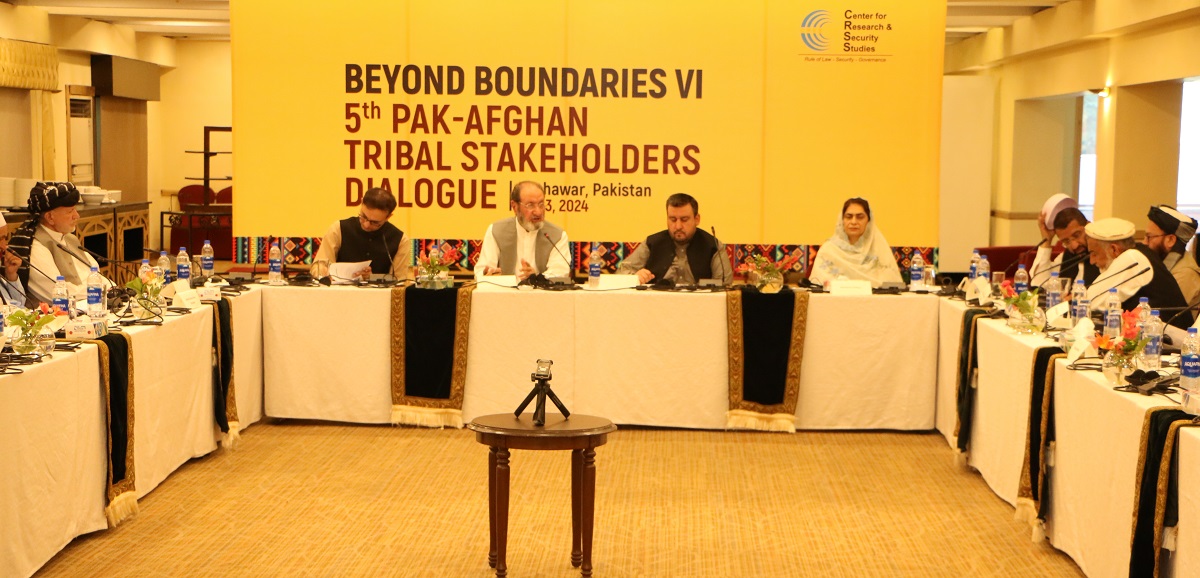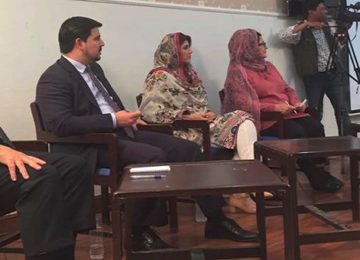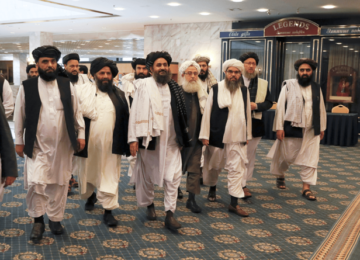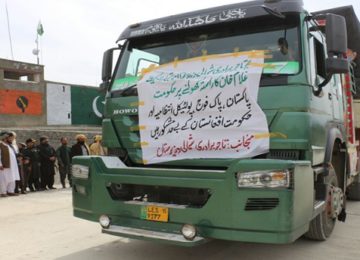Challenges and tensions escalate when there are no conversations at any level of bilateral relationship and both sides refuse to resort to dialogue. Without open channels of communication, misunderstandings and mistrust flourish, exacerbating existing conflicts and creating new ones.
Despite the numerous challenges jeopardizing their relationship, both nations must prioritize negotiations and diplomatic interventions over military options. Only through continuous and sincere dialogue can they hope to resolve their differences, build mutual trust, and pave the way for a peaceful and cooperative future.
These remarks were made by Pakistan’s former ambassador to Afghanistan, Ayaz Wazir while charing the 5th round of Pak-Afghan Tribal Stakeholders Dialogue organized by Center for Research and Security Studies (CRSS) in Peshawar.
Ambassador Wazir said that the issue of girls’ education lacks the focus and advocacy it deserves – especially by the broader Pakistani and Afghan societies who can help mobilize the much-needed pressure and citizens’ voices demanding to secure the future of Afghan youth and upholding their fundamental rights.
A huge onus lies on the religious community whose scholars should engage and sit with the de factor Afghan leadership to understand the obstacles and concerns and come up with the solution that lives up to the Afghan nation’s aspirations.
The efforts to empower female members of the society and educate them need to be taken and bolstered on both sides, especially in the border regions between Pakistan and Afghanistan which are yet to experience some serious developmental interventions.
Pakistan and Afghanistan are conjoined twins, and are never meant not to be separated. Both countries must stop the blame game and channelize and address their security concerns by strengthening their security against threats from terrorism and prioritize counter-terrorism cooperation.
Expressing solidarity with Afghanistan, Ambassador Wazir stated that Afghanistan’s pain is Pakistan’s pain. He discussed visa and passport issues, highlighting the need for inclusive decision-making processes involving all the relevant stakeholders.
“It was never a favor on Afghan refugees, it was our responsibility as a neighbor to facilitate them”, said Dr. Qibla Ayaz, member of the Shariat Appellate Bench of the Supreme Court and former Chairman of the Council of Islamic Ideology (CII) while noting that the influx of Afghan refugees into Pakistan, particularly during times of conflict in Afghanistan, should not be viewed as a charitable act or favor on Pakistan’s part. Instead, it should be seen as a humanitarian obligation that Pakistan, as a neighboring country, has towards those in need. Facilitating Afghan refugees aligns with the principles of good neighborliness and international humanitarian standards. By providing shelter, safety, and basic necessities, Pakistan acknowledges its role in supporting its neighbors during their times of crisis. This responsibility stems from shared cultural, historical, and geographical bonds, as well as from the moral imperative to aid those displaced by war and violence.
Despite the numerous challenges and conflicts faced by both Pakistan and Afghanistan, it is vital to maintain hope and a positive outlook towards the future. Despair can lead to inaction and a perpetuation of the status quo, while hope fosters resilience, encourages proactive solutions, and inspires collective action. By remaining hopeful, stakeholders and community members can continue to work towards peace, development, and mutual cooperation.
Dr. Aamer Raza from University of Peshawar, emphasized the significant issue of distrust between Afghanistan and Pakistan, which hinders the full potential of the relationship between these neighboring nations. This lack of trust manifests in various forms, such as political disagreements, border tensions, and mutual accusations where such distrust not only prevents meaningful cooperation in areas like trade, security, and cultural exchange but also exacerbates existing conflicts and creates new challenges. Rebuilding trust is crucial for leveraging the geographical, cultural, and economic ties that naturally exist between the two countries, and can pave the way for collaborative efforts that benefit both nations and their people.
To bridge this trust gap, Dr. Raza suggested empowering jirgas – which are traditional councils of tribal elders, to play a more active role in conflict resolution and community governance – by providing them with the necessary authority, resources, and support to effectively address local issues and contribute to broader peace-building efforts. By revitalizing and formally recognizing these councils, both governments can tap into a culturally relevant and trusted mechanism for resolving conflicts, fostering dialogue, and building trust at the grassroots level.
Dr. Raza also pointed out the critical issue of unemployment and the lack of job opportunities in the region, which drive people, especially the youth, towards unproductive or harmful activities. Without legitimate means to earn a livelihood, many are forced to turn to illegal activities, including smuggling, drug trafficking, or joining militant groups. By addressing unemployment, the region can reduce the appeal of extremist ideologies and criminal activities, thereby contributing to long-term peace and stability.
The participating tribal elders from the border regions between Pakistan’s Khyber Pakhtunkhwa and Afghanistan’s Nangarhar provinces shed light on several critical issues that need addressing to foster peace and development and highlighted the unique challenges faced by these areas and proposed strategies to overcome them.
The tribal leaders emphasized the importance of consulting and empowering them to effectively mitigate conflicts given their deep local influence and insights, making them crucial players in the peace-building process. They said that they may be uneducated in formal terms, they are far from uncivilized; their traditional wisdom and understanding of local dynamics are invaluable. Forming a committee of these tribal elders could facilitate the resolution of indigenous issues, leveraging their authority and knowledge to address conflicts at the grassroots level.
They said that poverty and unemployment are significant barriers to socioeconomic progress in the tribal regions. These issues drive individuals, particularly the youth, toward unproductive or harmful activities, including involvement with extremist groups. Creating sustainable job opportunities, promoting entrepreneurship, and enhancing skills are essential steps to combat these problems. By improving the economic conditions, the region can reduce the appeal of extremist ideologies, contributing to long-term stability and growth.
A two-way approach involving multiple stakeholders is crucial for both formal and informal conflict resolution processes. This approach should include dialogue with militants, encouraging them to lay down their weapons and integrate into the sociopolitical fabric. Ensuring their rehabilitation is vital for sustainable peace. Conflicts may not be entirely eliminated, but through continuous dialogue and negotiation, significant strides can be made toward reducing violence and fostering coexistence.
The said that for lasting peace, it is essential to respect and educate members of the tribal society, including future tribal leaders. Education empowers individuals and communities, fostering a culture of peace and development. The perception that tribal leaders oppose women’s education is a stereotype; in reality, they are passionate about educating girls. Pashtun culture aligns with the need to educate female members of society, and promoting this education can bring about positive change and progress.
They believed that sincerity is a prerequisite for peace. No jirga or conflict resolution system can yield results without sincere intentions and assurances from all parties involved. Establishing a representative jirga backed by both the Pakistani and Afghan states is necessary to facilitate meaningful dialogue and conflict resolution. The jirga system, rooted in tribal traditions, can play a pivotal role in harnessing the potential for peace and cooperation.
The discussions highlighted that peace is a shared responsibility that requires both sides to work for and create and utilize opportunities for it. War and conflict will persist as long as doors to peaceful negotiation remain closed. By opening these doors and working together, the tribal leaders and broader communities can pave the way for a more peaceful and prosperous future.
Both sides underlined that empowering tribal leaders, addressing socioeconomic challenges, fostering education, and promoting sincere dialogue are key to transforming the Pakistan-Afghanistan border regions. These steps can unlock the full potential of the relationship between these neighboring nations and build a foundation for lasting peace and development.








